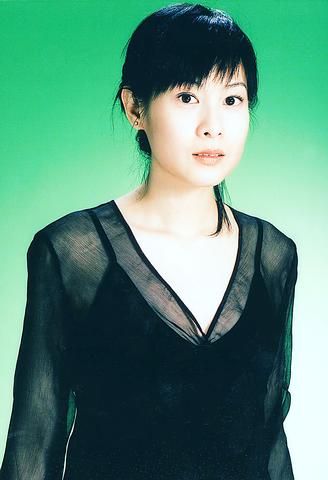It's World Cup time, which means there's going to be a lot of neglected girlfriends and wives for the next month. Well, at least that's what Rene Liu (
Her two nights of shows at National Taiwan University's spanking new domed gymnasium are being promoted like a huge slumber party for girls with soccer-crazed boyfriends, which helps serve as a tie-in for the pop idol's radio talk show called Rene's Diary (
The radio show is like a broadcast version of Seventeen magazine, where the topics up for discussion rotate daily around how to achieve the perfect body figure or tips on how to rein in recalcitrant lovers.

PHOTO COURTESY OF RED RED
There probably won't be much discussion of this type at the concert, but the theme of leaving those stupid men at home to watch the games on TV will definitely be in evidence. Despite this, half the crowd will probably still be young men eager to drool at the sight of one of the goddesses of Taiwanese film and song.
Or, disregarding the girlie theme all together, people may come out for a spectacular, pyrotechnic-filled show, which Mando-pop stars are so adept at putting on.
Rene's concerts this weekend promise to be no exception, with huge, elaborate stage sets and crates full of different costumes that she'll wear during the show, making it as much a fashion defilee as a musical concert. In fact, Rene's promoters said this week that she will attempt something previously unheard of: full costume changes in under one minute! In the insular world of Mando-pop this is considered a major achievement.
The only new material that Rene, who sometimes goes by the name Milk Tea, will be performing is her new single called A Lifetime of Solitude (
Last year's Full Bloom, for example, was one of the year's biggest hits with popular songs like Abandoned City (
Rene also has several movie and TV series soundtracks to draw from. If she really wants to pull the audience's heartstrings, she'll belt out the title song for the mini-series April Rhapsody (人間四月天), which triggered such a strong renewed interest in the life of the hopelessly romantic early 20th century Chinese poet Xu Zhimo, that several new print runs were made on all of his books in Taiwan to satisfy demand. Rene also played a lead role in the series.
With more than 10 years in film and music on her resume, and now with a new job as a radio show hostess, Rene is showing that she's quite capable of practically anything she attempts. She is not without her detractors, though. This week TV producer Tan Jen-Hsiung, who worked with Rene on many occasions, made headlines for disparaging remarks he made about the star. Using a Taiwanese slang term reserved for only the most uptight and smarmy people, he called her ging, keeping the gossip pages alight for several days.
Whether the comment was deserved or not, Rene can at least use her concerts this weekend to let her hair down and disprove any notion that she's uptight.

June 2 to June 8 Taiwan’s woodcutters believe that if they see even one speck of red in their cooked rice, no matter how small, an accident is going to happen. Peng Chin-tian (彭錦田) swears that this has proven to be true at every stop during his decades-long career in the logging industry. Along with mining, timber harvesting was once considered the most dangerous profession in Taiwan. Not only were mishaps common during all stages of processing, it was difficult to transport the injured to get medical treatment. Many died during the arduous journey. Peng recounts some of his accidents in

“Why does Taiwan identity decline?”a group of researchers lead by University of Nevada political scientist Austin Wang (王宏恩) asked in a recent paper. After all, it is not difficult to explain the rise in Taiwanese identity after the early 1990s. But no model predicted its decline during the 2016-2018 period, they say. After testing various alternative explanations, Wang et al argue that the fall-off in Taiwanese identity during that period is related to voter hedging based on the performance of the Democratic Progressive Party (DPP). Since the DPP is perceived as the guardian of Taiwan identity, when it performs well,

A short walk beneath the dense Amazon canopy, the forest abruptly opens up. Fallen logs are rotting, the trees grow sparser and the temperature rises in places sunlight hits the ground. This is what 24 years of severe drought looks like in the world’s largest rainforest. But this patch of degraded forest, about the size of a soccer field, is a scientific experiment. Launched in 2000 by Brazilian and British scientists, Esecaflor — short for “Forest Drought Study Project” in Portuguese — set out to simulate a future in which the changing climate could deplete the Amazon of rainfall. It is

Artifacts found at archeological sites in France and Spain along the Bay of Biscay shoreline show that humans have been crafting tools from whale bones since more than 20,000 years ago, illustrating anew the resourcefulness of prehistoric people. The tools, primarily hunting implements such as projectile points, were fashioned from the bones of at least five species of large whales, the researchers said. Bones from sperm whales were the most abundant, followed by fin whales, gray whales, right or bowhead whales — two species indistinguishable with the analytical method used in the study — and blue whales. With seafaring capabilities by humans